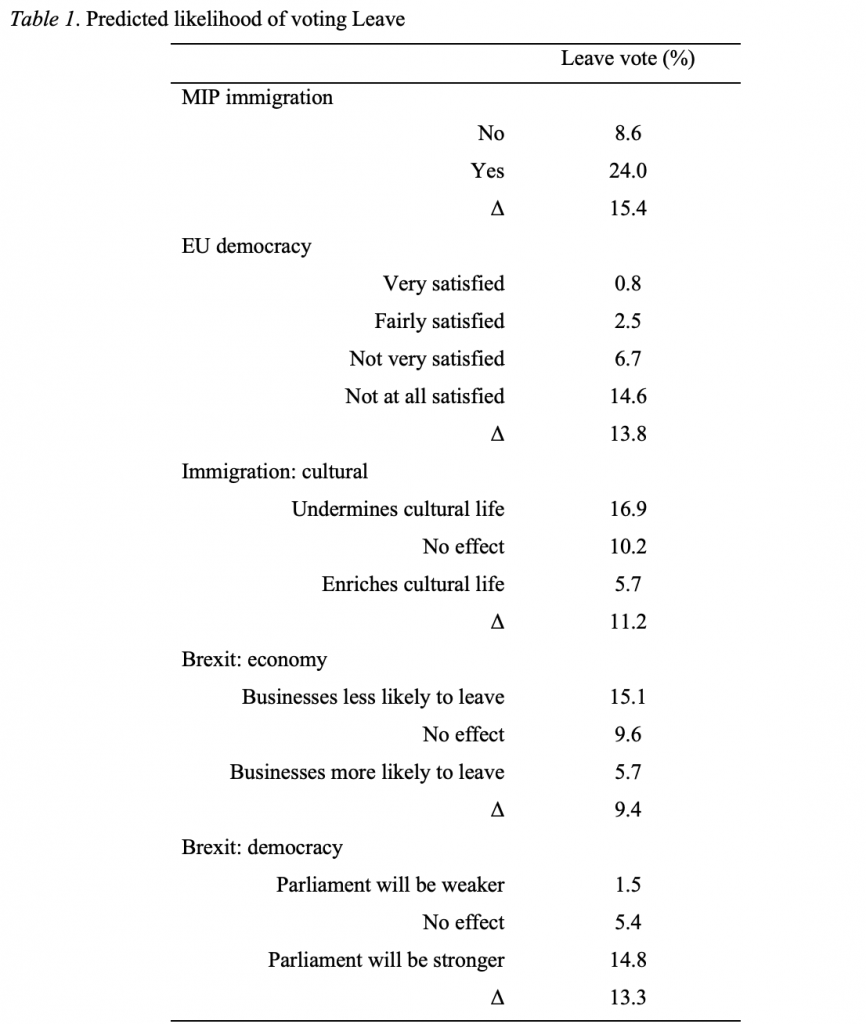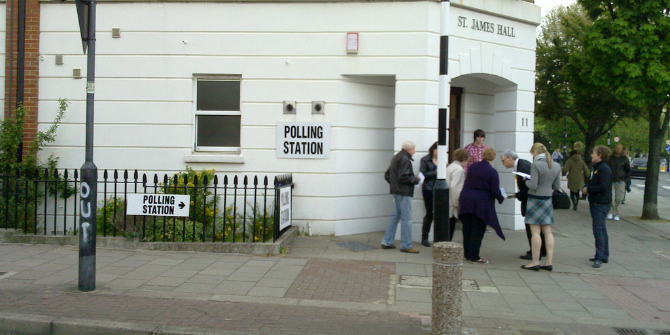

 Siim Trumm, Caitlin Milazzo, and Joshua Townsley use survey data to explore support for Brexit among 2017 parliamentary candidates. The findings reveal some interesting insights into politicians’ motivations for supporting Brexit. For example, candidates standing in seats with higher Leave support were not significantly more likely to vote Leave themselves. Instead, candidates’ views on immigration and democracy stand out as key determinants of their decision to vote Leave.
Siim Trumm, Caitlin Milazzo, and Joshua Townsley use survey data to explore support for Brexit among 2017 parliamentary candidates. The findings reveal some interesting insights into politicians’ motivations for supporting Brexit. For example, candidates standing in seats with higher Leave support were not significantly more likely to vote Leave themselves. Instead, candidates’ views on immigration and democracy stand out as key determinants of their decision to vote Leave.
The United Kingdom’s decision in 2016 to leave the European Union marked a significant historical juncture and has defined politics since. The referendum result was also somewhat unexpected, leading to several studies exploring the question of who supported Brexit. Most of these have, however, focused on voters.
We conducted a study to explore the extent of support for Brexit among parliamentary candidates and the factors that drive it. What did we expect? Of course, there should be clear differences along party lines, with Conservative and UKIP candidates more likely to support Brexit than their Labour and Liberal Democrat opponents. But beyond this, we might also expect some of the same factors that drive Leave versus Remain divide among voters to be at play among politicians. We might, therefore, expect support for Brexit to be stronger among male candidates, older candidates, and those who have an occupational background in manual work. Brexit support might also be higher among candidates who hold stronger British identity and are more concerned about immigration. We also expected candidates who seek to represent areas with higher levels of support for Brexit to be more likely to support Brexit themselves.
We analysed data from the 2017 British Representation Study to test our expectations. Our analysis includes responses from 872 candidates who stood in the 2017 election. The sample is broadly representative of all 2017 candidates in terms of partisanship, nation, and electoral performance.
We ran a series of logistic regression models to predict Leave support among candidates. Table 1 presents the predicted probabilities (in effect, the likelihood of a candidate supporting Leave based on a particular characteristic, while the other characteristics are held constant) for candidates’ likelihood of voting Leave, to illustrate the findings of our models. The first characteristic, for instance, shows that the probability of voting Leave is 24% among candidates who consider immigration-related issues to be the most important problem facing the country (versus 8.6% among those who do not).
So, what explained candidates’ support for Leave? Interestingly, we find that candidates’ gender, age, occupational background, and incumbency status have no systematic effect on their likelihood of voting Leave or Remain. This appears to contrast with what we know about how voters broke for Leave versus Remain. We also find that, after controlling for all other variables, candidates who stood in constituencies with stronger Leave support were not significantly more likely to support Brexit themselves. This, again, reinforces the narrative that would-be MPs were somewhat ‘out of touch’ with their voters.
Elsewhere, we found similarities. Like voters, candidates were more likely to support Brexit if they considered immigration to be the main problem facing the country and thought negatively about its cultural impact. Candidates who believed that Brexit would be positive for the UK’s economy and democracy, and were more critical about the state of EU democracy, were also more likely to be Leavers than those who did not hold such views.
Interestingly, we can also compare the pre-referendum voting intention and the actual vote choice for 442 candidates by combining survey data from the 2015 and 2017 British Representation Study. Whereas polling of voters suggests that there was quite a bit of fluidity in public opinion during the 12 months leading up to the EU referendum, this was not the case among politicians. Table 2 shows that only 12 (out of 442) candidates changed their mind in the run up to the 2016 referendum, constituting only 2.7% of all candidates we have this information for. An overwhelming majority of candidates (97.3%) remained unchanged in their vote choice. Unsurprisingly, the most common option was candidates who intended to vote Remain indeed casting their ballot for Remain (363 candidates, or 82.1%). Meanwhile, 67 (15.2%) candidates who intended to vote for Leave do so. In other words, there were very few candidates who switched their voting choice in the immediate run up to the EU referendum.
There are three broad conclusions arising from our study. First, the evidence reaffirms the narrative in British politics that politicians were ‘out of touch’ with voters when it came to supporting Brexit in 2016. They were much less supportive of Brexit than the electorate as a whole and this gulf was not just between voters and the political elites at the very top of the political ladder, but between voters and the ‘political class’ more broadly.
Second, support for – and opposition to – Brexit was quite stable among would-be MPs. While support for Leave varied between politicians with contrasting political beliefs and perceptions of immigration, we did not find evidence that many candidates switched sides in the run up to the EU referendum.
Finally, the findings reveal some interesting differences and similarities between the motivations for Leave support among politicians and voters. Contrary to our expectations, we find that some of the factors that drove voter support for Brexit (e.g., age, gender, occupational background) do not have the same effects among candidates. But, just like voters, more optimistic views of how Brexit was expected to impact British democracy and economy, as well as attitudes on immigration, are associated with greater likelihood of voting Leave.
____________________
Note: The above draws on the authors’ published work in Political Studies.
 Siim Trumm is Assistant Professor in Politics at the University of Nottingham. His areas of research include British politics, party politics, parliaments and legislative behaviour, and electoral campaigns.
Siim Trumm is Assistant Professor in Politics at the University of Nottingham. His areas of research include British politics, party politics, parliaments and legislative behaviour, and electoral campaigns.
 Caitlin Milazzo is Associate Professor in the School of Politics and International Relations at the University of Nottingham. Her areas of research include electoral behaviour, British politics, and political campaigning.
Caitlin Milazzo is Associate Professor in the School of Politics and International Relations at the University of Nottingham. Her areas of research include electoral behaviour, British politics, and political campaigning.
 Joshua Townsley is a Research Fellow at the University of Nottingham. He researches electoral campaigns and political behaviour.
Joshua Townsley is a Research Fellow at the University of Nottingham. He researches electoral campaigns and political behaviour.
All articles posted on this blog give the views of the author(s), and not the position of LSE British Politics and Policy, nor of the London School of Economics and Political Science. Featured image credit: by Parker Johnson on Unsplash.









